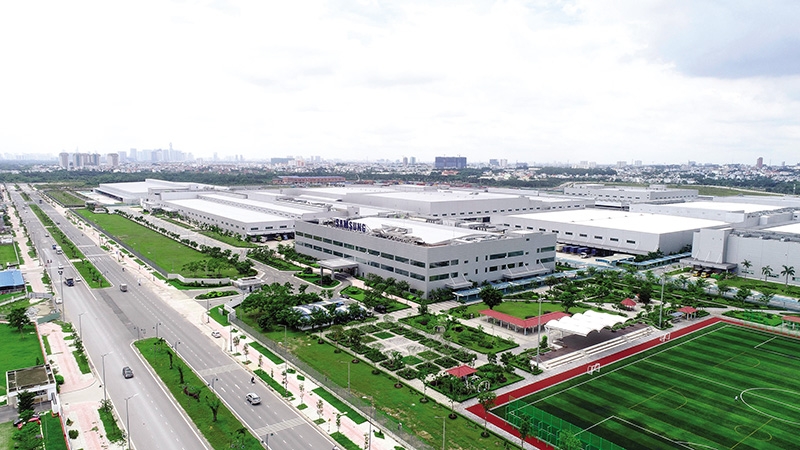Industrial zones drive growth in Thai Nguyen province
 |
| The last six years have seen impressive indicators in Thai Nguyen, thanks in part to the presence of Samsung |
According to Phan Manh Cuong, director of Thai Nguyen Industrial Zones (IZ) Management Authority, the province enjoys favourable geographical, economic, and political conditions for the development of IZ infrastructure and investment attraction.
The province is currently home to six IZs, covering a total area of 1,420 hectares and whose general planning schemes were approved by the prime minister. These IZs have attracted 211 projects, including 109 domestically-invested ones registered at more than VND15 trillion ($652 million) and 102 foreign-invested ones with total registered capital of $8.16 billion.
Of those, around 150 projects have come on stream with the remainder mostly in the construction phase and operating in diverse fields such as electronic production and supporting industries, mechanical manufacturing, and textile clothing, among others.
Last year, projects based in the province’s IZs posted buoyant achievements. Particularly, disbursed foreign direct investment surpassed $6.81 billion, reaching 90 per cent of the total FDI committed capital. Meanwhile, Thai Nguyen boasted nearly VND9 trillion ($391 million) of domestic investment, equal to 60 per cent of the total registered capital.
Ventures raked in nearly $29 billion in revenue with industrial production value making up 92 per cent of the province’s total, export value touching $25 billion, and the budget contribution amounting to VND7.06 trillion ($307 million), equal to 46 per cent of the province’s total.
Significantly, FDI attraction to the province’s IZs reported stable on-year growth, particularly from 2013, when South Korean tech giant Samsung began operations at Yen Binh IZ. That currently still creates a driving force for the province to spur industrial production, as well as facilitate socio-economic development.
Statistics by Thai Nguyen Department of Planning and Investment show that between 2001 and 2012, FDI flow to the province’s IZs was modest with only nine projects by the end of the period. The Samsung factor invoked a turnaround in the situation, with total foreign-invested projects reaching 24 in number by the end of 2013.
The following three years were considered golden for overseas investment attraction to the province’s IZs, with more than 17 such projects landing annually, a pace which is continuing until the present day.
According to Thai Nguyen Industrial Zones Management Authority, related development figures in the first eight months this year were upbeat. Particularly, cumulative disbursed capital reached $7.1 billion, revenue touched $19.1 billion, export value was estimated at $17 billion, budget contributions hit VND4.37 trillion ($190 million), and nearly 112,000 labourers were given jobs at province-based IZs.
Recent figures by Thai Nguyen Department of Planning and Investment show that in the first nine months of 2019, the province welcomed more than 60 local and international visitor groups coming to search for investment opportunities in the province’s IZs.
As a result, three investors have signed land lease agreements for project executions at Song Cong II IZ. Additionally, during the period, Thai Nguyen granted new investment certificates to 18 projects to set down in IZs and approved 36 revised investment projects, of which 15 schemes increased capital by a total of $53.7 million.
The projects’ effective operation thus far has contributed to driving local economic growth, particularly in raising export value, transforming the province’s economy in a positive manner with increased proportion of trade and services and gradually reduced percentage of agro-forestry, thus helping to improve international payment balances.
What the stars mean:
★ Poor ★ ★ Promising ★★★ Good ★★★★ Very good ★★★★★ Exceptional
Related Contents
Latest News
More News
- US firms deepen energy engagement with Vietnam (February 05, 2026 | 17:23)
- Vietnam records solid FDI performance in January (February 05, 2026 | 17:11)
- Site clearance work launched for Dung Quat refinery upgrade (February 04, 2026 | 18:06)
- Masan High-Tech Materials reports profit: a view from Nui Phao mine (February 04, 2026 | 16:13)
- Hermes joins Long Thanh cargo terminal development (February 04, 2026 | 15:59)
- SCG enhances production and distribution in Vietnam (February 04, 2026 | 08:00)
- UNIVACCO strengthens Asia expansion with Vietnam facility (February 03, 2026 | 08:00)
- Cai Mep Ha Port project wins approval with $1.95bn investment (February 02, 2026 | 16:17)
- Repositioning Vietnam in Asia’s manufacturing race (February 02, 2026 | 16:00)
- Manufacturing growth remains solid in early 2026 (February 02, 2026 | 15:28)

 Tag:
Tag:




















 Mobile Version
Mobile Version